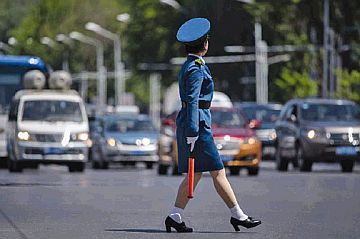
North Korea’s traffic ladies are officially known as traffic security officers who are chosen for their looks in a society that remains traditionalist in many respects.
/AFP
Snapping their heads from side to side, marching into the roads in close-fitting blue uniforms and black heels, the “traffic ladies” who marshal vehicles at the intersections of Pyongyang are an emblematic image of the North Korean capital.
Officially known as traffic security officers but universally referred to as traffic ladies, they are chosen for their looks in a society that remains traditionalist in many respects.
They must leave the role if they marry, and have a finite shelf-life, with compulsory retirement looming at just 26.
The 300-odd ladies are unique to Pyongyang, which North Korean authorities are always keen to present in the best possible light despite their nuclear-armed country’s impoverished status, and ensure a steady supply of photogenic young women who are the favorite subject of visiting tourists and journalists.
“They are representing the capital city,” explained a senior officer of the ministry of public security, which supervises traffic regulation. “That’s why they are selected based on their appearance and physique.”
No age limit applies to their roughly 400 male counterparts – who tend to be stationed at roundabouts.
The rules were because “normally, the women in our country marry at the age of 26 or 27,” explained the officer, who did not want to be named. “Because the role is tough and difficult, they can only do the job when they are single.”
The traffic ladies were originally introduced in the 1980s, when vehicles were a rarity on the streets of Pyongyang and remained so for decades, giving rise to the surreal sight of them directing – with precision and energy – non-existent cars on wide but deserted boulevards.
As part of North Korea’s security forces they hold officer ranks, and Senior Captain Ri Myong-Sim, 24, said: “I have to carry out each and every action with discipline and spirit.”
A seven-year veteran, she cuts an imposing presence in her high-peaked cap and white gloves.
Her “tough training” had involved “exhausting repetition” of the moves, she told AFP.
“But every time I felt that, the thing that kept me going and drove me was the thought that our leader, who cares for only the happiness of our people all year long, was watching us work,” she said, standing ramrod-straight at the Changjon crossroads in central Pyongyang.
“So I could practice throughout the night and keep going on the next day without feeling tired at all.”
Ordinary North Koreans normally only express officially approved sentiments when questioned by foreign media.
An obelisk down the road proclaimed: “The Great President Kim Il-Sung and the Great Leader Kim Jong-Il will always be with us.”/AFP

